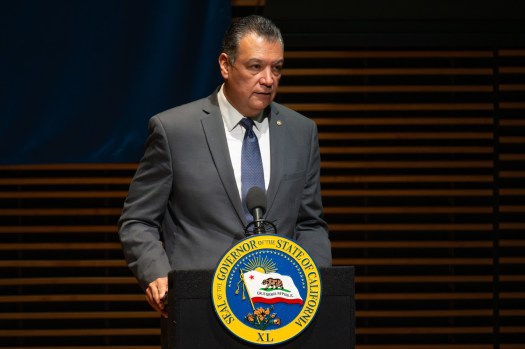Senator Alex Padilla has expressed interest in running for governor of California when current Governor Gavin Newsom completes his term in 2026. In a recent interview with Politico, Padilla stated, “I love California. I’ve had the honor of serving in many different capacities…I hope to continue to serve … in some capacity for the foreseeable future.” This statement has sparked speculation regarding his intentions for the upcoming gubernatorial race.
Padilla’s current term in the Senate extends until 2029, allowing him to maintain his position while pursuing the governorship. This scenario raises questions about why he would consider leaving a secure Senate seat, particularly given the advantages of representing a predominantly Democratic state. The dynamics of California politics suggest that Padilla’s decision to enter the race could signal a lack of confidence among party leaders in current frontrunner Katie Porter.
Despite polls indicating that Porter leads the race, the absence of endorsements from significant Democratic figures, including her colleagues in the California delegation, suggests underlying tensions within the party. Former Congressman Harley Rouda has criticized Porter, describing her as overly focused on internal party conflicts rather than collaborative governance. His remarks reflect a broader sentiment that some party members feel uneasy about Porter’s candidacy.
As the political landscape unfolds, Padilla’s potential entry into the gubernatorial race could serve multiple purposes. Firstly, it might indicate that the Democratic establishment is searching for a candidate who can unify the party and present a stronger front against potential Republican challengers, such as former Fox News host Steve Hilton and Riverside County Sheriff Chad Bianco.
Polls illustrate that, if the election were held today, Porter would likely advance to the November ballot alongside one of the Republican candidates. This aligns with the findings of recent surveys that show her as a strong contender. However, the enthusiasm surrounding her candidacy contrasts sharply with the cautious approach exhibited by influential Democrats who may not fully support her.
Should Padilla decide to run, it could also reflect his personal ambitions beyond the governorship. Some observers speculate that he may be positioning himself for a future presidential bid. This perspective raises concerns about whether his motivations align more with personal aspirations than the needs of California residents.
The upcoming political landscape in California is complex. With Padilla’s possible gubernatorial campaign, the Democratic Party faces a critical moment that could reshape its influence in the state. The outcome of this race may significantly impact California’s policy direction and its role in national politics.
Padilla’s intentions, alongside the dynamics surrounding Porter, highlight the intricacies of political maneuvering within the Democratic Party. As candidates begin to emerge, the 2026 gubernatorial race promises to be a significant event in California’s political history. The implications of these decisions will likely resonate beyond state lines, affecting national political conversations for years to come.
